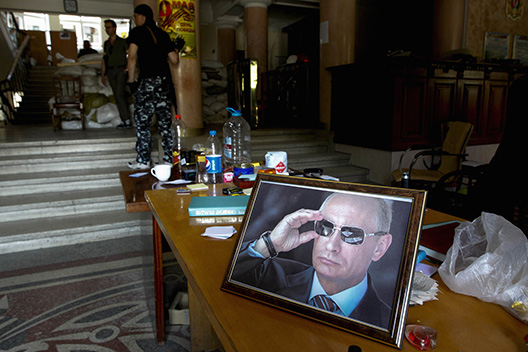
Atlantic Council’s John Herbst Cites Putin Pullbacks, Statements by Russian Leaders in Ukraine Insurgency
Today’s announcement by Russia’s government that President Vladimir Putin has ordered a pullback of Russian troops from Ukraine’s border is the latest of a half-dozen signals that “the Russian effort to destabilize eastern Ukraine is losing steam,” according to the director of the Atlantic Council’s Eurasia Center, former US ambassador to Ukraine John Herbst.
“Putin is looking for a way out at the moment from his efforts to destabilize the east,” Herbst said in an interview at the Council. “It doesn’t mean he’s given up, but he doesn’t want Western sanctions coming down heavily on his head if he is seen as disrupting Ukraine’s election” for a new president to be held Sunday.
While US and NATO officials said today that their surveillance data have shown no movement of the estimated 40,000 Russian troops deployed close to Ukraine, Herbst suggested that it may be too soon.
Putin failed to act on a similar announcement on May 7, but may do so this time, Herbst said. “Let’s give it 24 hours,” he said, to see whether any pullback orders that might have been sent from Moscow yield movement by the military units on the ground.
Another indicator of a stall in Russia’s assault on Ukraine is a video issued over the weekend by the Russian army colonel who heads the secessionist guerrilla forces. In the video, Colonel Igor Girkin complained that local residents were failing to volunteer to fight for the separatist cause. He accused the men of Donetsk province of cowardice and said he now would recruit its women instead. Disarray in what had been a largely clandestine Russian effort to raise an insurgency in eastern Ukraine was underscored over the weekend, Herbst said “when the ‘leader’ of this so-called Donetsk People’s Republic admitted publicly that he’s in fact a Russian citizen.”
The other signs cited by Herbst are these:
- Russia’s agreement to let the Organization for Security and Cooperation in Europe (OSCE) to send election observers to Ukraine’s vote next Sunday, May 25, for a president to replace the former Putin ally, Viktor Yanukovych, following his ouster in February. Because the OSCE operates by consensus, Russia as a member of the group could have vetoed the move. “But I think Putin understood that the sanctions were dangerous, especially since German Chancellor Angela Merkel said in Washington” on May 2 that broader Western sanctions against entire sectors of Russia’s economy “would follow if the Russians disrupt the elections. He may be looking for a way to climb down from that.”
- Recent Russian “statements for the first time that the [presidential] election could stabilize the situation in Ukraine, when the Kremlin’s line a month ago was that the election was illegitimate and should not be held.” Putin told reporters May 7 that the Ukraine presidential vote would be “a step in the right direction,” and Foreign Minister Sergei Lavrov told Bloomberg News on May 15 that “we can do business with anyone” who is elected.
- “The clear decision by [Donetsk business magnate and power broker] Rinat Akhmetov last week to join those fighting for the territorial integrity and unity of Ukraine. When his steelworkers helped establish order in Mariupol,” a port city in southernmost Donestk province where secessionists had taken partial control and had fought with Ukrainian police, “that was a big sign to the Kremlin that this effort of insurgenc was failing.”
- “If you’ve been watching the demonstrations that the insurgents have been trying to put on in the east, they’ve been laughable. In Donetsk, they managed to rally in the past few days only 300 people, maybe 200 people. The same is true in Odessa,” Ukraine’s main port.
Image: A portrait of Russian President Vladimir Putin is displayed on a table in the hall of a regional administration building occupied by pro-Russian activists in the eastern Ukrainian city of Luhansk May 17, 2014. REUTERS/Valentyn Ogirenko
